you must change your life
or maybe just tweak a thing or two + goals and intentions for September
Welcome to Write More! This is the monthly intentions email, which goes out the last Sunday before a new month starts. It’s a chance to fight the Sunday Scaries by thinking through your goals and intentions for your writing practice in the coming month and to reflect on your progress in the previous month.
If that sounds helpful and fun, subscribe here.
Fall is so close, friends. I can feel it. This is the time of year when my mind turns to school supplies and cardigans. Even more than at the start of a new calendar year, fall and back to school season kickstarts all my impulses around planning and systems. I can’t tell you how many years I’ve spent this season searching for the right big calendar and pens and notebook/binder/folder system, certain that this combination of highlighters and college-lined looseleaf will finally unlock my maximized productivity.
This year, I’d like to make a Modest Fall Proposal. I’d bet that what you need is not a better system but more clarity about what you’re working on and why it matters to you.
You don’t need to change your life. You don’t need a new binder or a fancy customized planner or a new system for tracking your time.
(Though if buying pens or a new notebook makes you happy, go for it! And as much as I said you don’t need a new system, I have to share this amazing sticker chart Catherine Newman said she used to help her write her new book We All Want Impossible Things. She shared it in her interview with Molly Wizenberg, in Molly’s newsletter, I’ve Got a Feeling.)

So here’s what I’m focusing on this season: figuring out what matters in my writing life and making the space to commit to that work.
In that spirit, today’s newsletter features an interview with Heather Lanier, whose writing and grounded way of talking about writing and moving through the world has meant so much to me in the last couple of years. I first got to know Heather through her writing—after reading her amazing essay SuperBabies Don’t Cry, I reviewed her book Raising a Rare Girl for Literary Mama —and now we live just a couple towns away from each other in New Jersey.
You can find Heather on twitter and instagram (@heatherklanier on both) and in her great newsletter The Slow Take.
Her TED Talk, “‘Good’ and ‘bad’ are incomplete stories we tell ourselves,” has been watched nearly 3 million (!!!) times.
Below you’ll find my conversation with Heather, which is full of good ideas about how to think about what matters in your writing life and how to write through the season you’re in.
to write as a way to be more fully alive: a conversation with poet and essayist Heather Lanier
Nancy
I’ve been a fan of your writing for years, and it was a post on instagram recently that spurred me to ask you to do this interview. You were writing a bit about the Lazy Genius, whose tagline is “be a genius about what matters and lazy about everything else,” and how in your own life, you were only able to do a couple things–I believe it was taking care of your family, teaching your classes, and tending whatever word doc you’re working on. How have you defined what matters in your writing life?
Heather
Oh, this is a great question! I only have so much energy for promotion. So, even though the public hustle might matter a lot to the marketplace, it doesn’t matter a ton in my writing life. I suppose it helps to figure out why I write. I write to make meaning of the world, to commune with something bigger than me, to say yes to some weird inquiry that demands my intellectual and creative and emotional efforts. I mean, I write because I like it! It fuels me, makes me feel better about being alive!
So, what matters in my writing is whatever I’m working on that I’m excited about—or that I was excited about at some point and have since committed to finishing. What matters is devoting myself, in hour-long chunks each day, to that thing. I try not to prioritize what I can’t really control. I can’t control whether a piece is published in X journal, or if my book gets praised by Y reviewer. But I can commit each day to what I’m inherently driven to make, and try to see it through to the best of my ability. And I can make sure I’m sending work out when it’s ready.
Nancy
Resisting productivity culture–the pressure so many of us feel to produce more and work faster–is one of the enduring obsessions of this newsletter. One of the things I really love about your work is the slowness you bring to it. (And your newsletter’s title–The Slow Take–communicates that so well!) You wrote something recently about finally nearing the end of an essay that had taken you a year to write. Is that slowness something you’ve cultivated deliberately?
Heather
I love that your newsletter focuses on resisting productivity culture! Ironically, the long essay I just finished (which yeah, took a year) is about mortality and the human heart, but it touches on productivity culture, and how we believe the body is a machine. I didn’t want this essay to take a year. That’s just what the project demanded. I realized early on that if I was to do the piece right, I’d have to learn a lot of things I didn’t know. So I did a ton of research: about the history of cardiology, the mechanics of the heart, heart-related mythologies, and so on.
It’s been great fun, but I’ve also written flash pieces this year that have taken just a few days. I think I’m less interested in slowness, more interested in giving each project the time it deserves. I’m interested in really listening to a piece, in seeing what its inner vision wants to be. I firmly believe each piece has an inner vision, and it’s my job to stick with it long enough to figure it out. And that often takes a really long time. I just learned from an Ellen Bass lecture that Ezra Pound’s “In a Station at the Metro” took six months! That’s a fourteen-word, two-line poem.
You can help other people find this newsletter by clicking the little heart at the top or bottom of this email!
Nancy
Another Lazy Genius principle that’s been helpful to me is the idea of “living in the season,” which can mean both the actual season of the year, or a season of life, like having small kids or being in a difficult moment professionally or personally. I feel like this is something you’re really mindful as well–thinking about your capacity in a given moment and just working to that, rather than fighting beyond that. How does your writing life shift with the season?
Heather
Oh, it changes all the time. Before I had kids, I wrote a book by waking at 5 a.m. and writing until 7. I can’t do that anymore, because my child doesn’t sleep, and hasn’t slept in a decade, so I don’t put those kinds of pressures on my waking hours. When the kids were babies, I squeezed small bits of writing into nap hours or pumping sessions. I kept a blog during those years. When they were finally in school, that material became a book. During the thick of the pandemic, when all our mental capacities shrank because the public health situation kept shifting under our feet, I wrote short essays rather than long essays. I just couldn’t predict what really mattered to me emotionally or intellectually when Alpha evolved to Delta and don’t-buy-masks became yes-wear-masks, which then became don’t-wear-that-mask-wear-this-one. So I wrote flash nonfiction and op-eds. Now that we have a bit more ground under our feet, I’m writing longer literary essays. In other words, I change the form based on the season.
Also, I know I have an easier time developing new ideas when I’m not super stressed. As a professor, I do messy generative work on breaks and during the first few weeks, before the grading mounds descend. I use the most stressful parts of the semester for housekeeping: editing, submitting. Cortisol seems to activate my critical brain, not my creative one. I try to make that work to my writing’s advantage… rather than its detriment.
One constant is that I just try to show up to something, five days a week, for an hour or even thirty minutes a day. And I’m usually always working on a few things at a time. Essays and poems are simmering on the backburners.
Nancy
We’re shifting into back to school now. I love the energy of a new school year, but I sometimes get overexcited and think I’m going to revolutionize my whole life. What are you thinking about in terms of goals and hopes for this coming semester?
Heather
My goals are always the same: To write as a way to be more fully alive. To be immersed in something creatively challenging. To commit myself each day to the work–whatever Word doc is open lately.
Nancy
Could you share a writing exercise or strategy? What do you do when you’re feeling stuck in your writing life?
Heather
Here’s what I do when I’m stuck in my writing life:
Write three morning pages, a la Julia Cameron.
Read until I find a voice I love, someone who helps me stay open. (Danusha Lameris’ Bonfire Opera is a favorite.)
Find an old, unfinished thing and just start to prod at it.
Go to an art gallery. Be moved by art in a different medium.
One or more of these usually gets me unstuck.
reflecting on August + setting intentions for September
What happened in your writing life in August? What are you working on, and what tweaks do you want to make to your process and your priorities this month? As I’ve talked about before, I like to do a count at the end of each month, and I think that can be especially helpful in a slow-moving month like August, where it might be hard to feel like you’ve done much of anything. (And I believe in counting everything—stuff I’ve applied for, time I’ve spent writing, things I’ve pitched or submitted, even connections I’ve made with other writers or books that have helped me think about my writing.) So what does your August count look like?
As you think ahead to the fall, I’d encourage you to resist that sharpened pencil-new binder energy that might be making you think you need to change your whole life. Instead, take some time to consider what matters to you about your writing life in the coming month. Do you have projects you want to return to or finish? Do you want to just get back into your writing in a more regular way? Are you looking for community? Instead of creating a new system or buying new supplies, think about what matters to you, and go from there.
It might also help to think about what Heather said about writing through the season you’re in. If September’s going to be busy and disjointed as you adjust to the schedule of a new school year, for example, this might not be the month to commit to finishing your novel. Think about the time and energy that’s available for you this month and consider what you might prioritize in this season.
If this newsletter has helped you in your writing life, clicking the little heart at the top or bottom of this email will help other people find it!
elsewhere on the internet
I’m teaching an 8-week online poetry workshop this fall through Blue Stoop. If you’ve enjoyed this newsletter’s process-focused, attention-oriented approach to writing, I think you’ll really enjoy the workshop. The deadline to apply is August 30. (But don’t let the idea of an application stress you out—it’s open to anyone who’s interested, and you don’t have to have experience with poetry to join us!) You can read more and find the link to apply here.
My Long Devotion co-editor Emily Pérez and I were on the Thryving Mother podcast talking about rediscovering a creative spark through motherhood. (We also talked about Emily Mohn-Slate’s amazing poem, “Feed,” which is in our anthology as well as her book, The Falls.) Because host Casey James is fancy and Canadian, the title of our episode is “Honouring the Multifaceted Experience of Motherhood with Writers” with that snazzy British spelling. (She was also suitably appalled when we talked about the lack of paid parental leave here. Get it together, America)
Write More, Be Less Careful is a newsletter about why writing is hard & how to do it anyway. What are your hopes for your writing life this fall? What tweaks are you making to your process or your routine? Reply to this email, comment below, or find me on twitter (@nancy_reddy) and instagram (@nancy.o.reddy).
If you’ve enjoyed this newsletter, I’d love it if you would share it or send it to a friend.


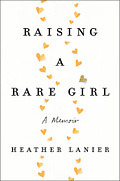

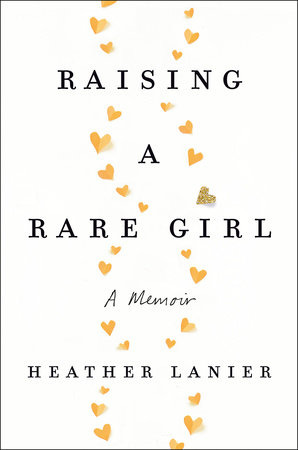
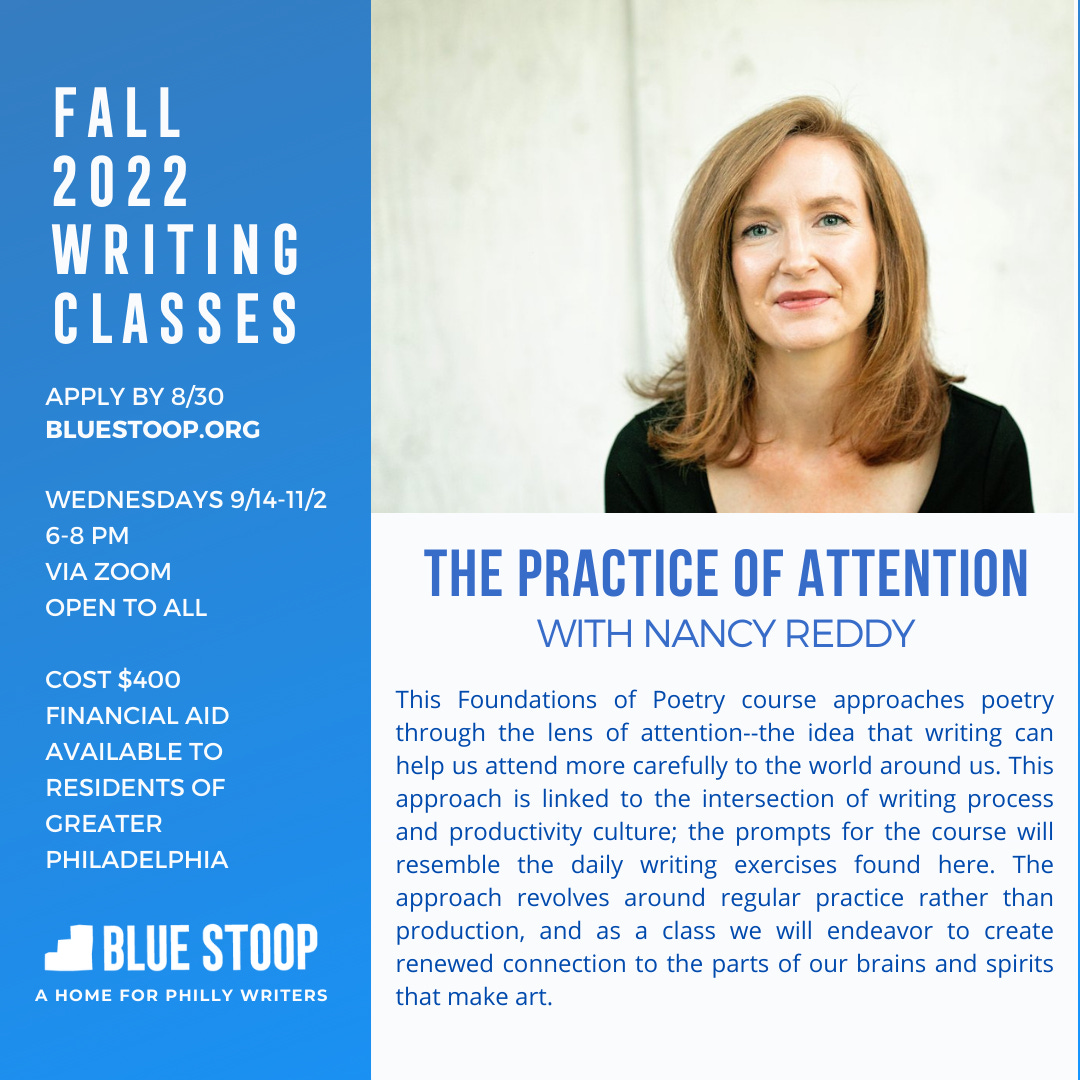
Love this Nancy! I think a lot about intentions in this liminal late-August, pre-September/school space. And I am SO making a sticker chart a la Catherine Newman, who I love. Will gladly share this in my newsletter, The Proem, as well!
Love Heather’s work and love this conversation! So much to think about. I fully admit to getting swept up in back to school/need new systems overwhelm and appreciate this reminder that I don’t need to reorganize every room in my house/aspect of my life right now (when book revisions are due in a week, ack).